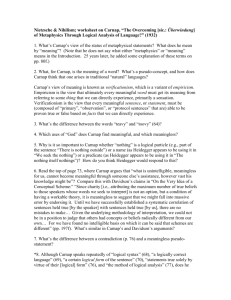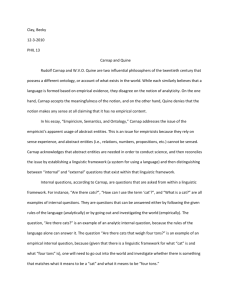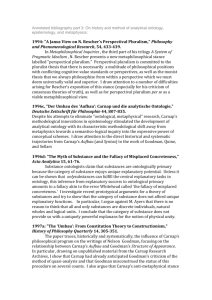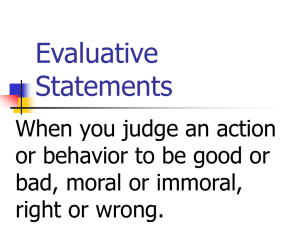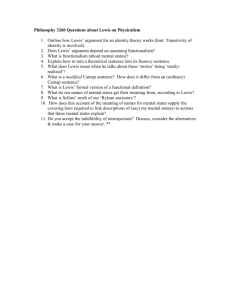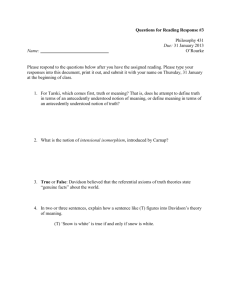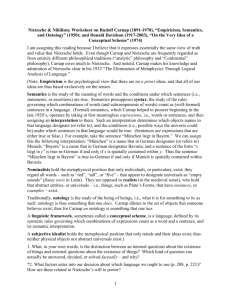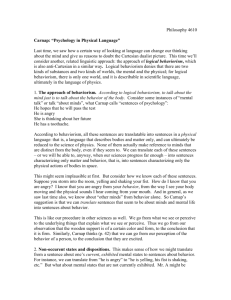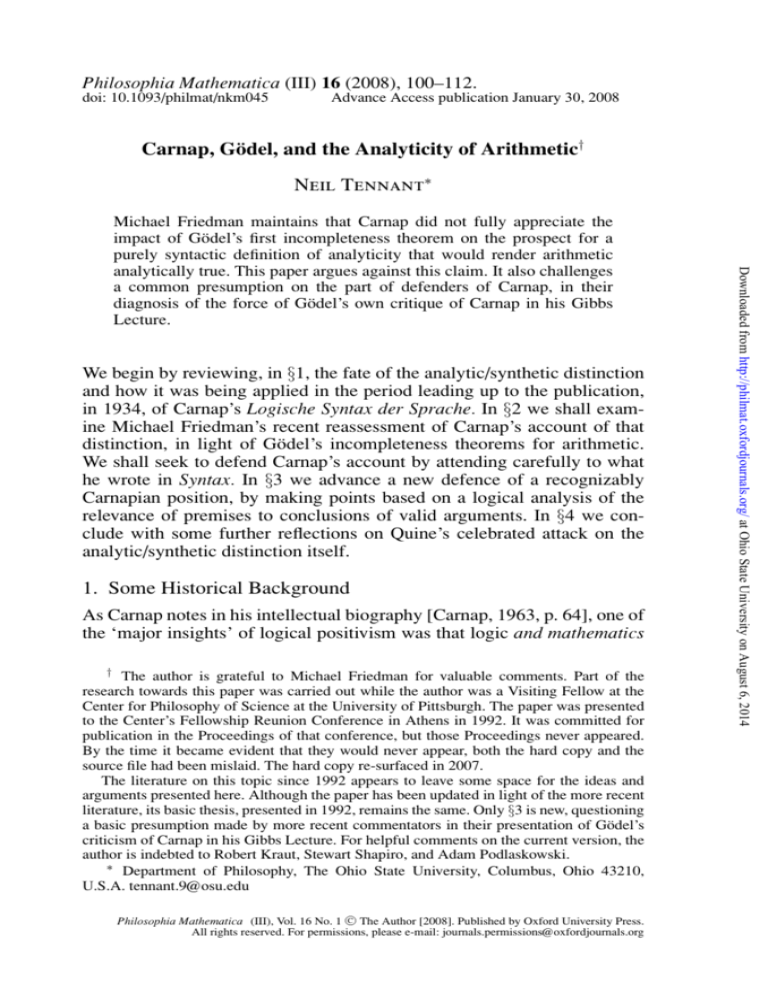
Philosophia Mathematica (III) 16 (2008), 100–112.
doi: 10.1093/philmat/nkm045
Advance Access publication January 30, 2008
Carnap, Gödel, and the Analyticity of Arithmetic†
Neil Tennant∗
We begin by reviewing, in §1, the fate of the analytic/synthetic distinction
and how it was being applied in the period leading up to the publication,
in 1934, of Carnap’s Logische Syntax der Sprache. In §2 we shall examine Michael Friedman’s recent reassessment of Carnap’s account of that
distinction, in light of Gödel’s incompleteness theorems for arithmetic.
We shall seek to defend Carnap’s account by attending carefully to what
he wrote in Syntax. In §3 we advance a new defence of a recognizably
Carnapian position, by making points based on a logical analysis of the
relevance of premises to conclusions of valid arguments. In §4 we conclude with some further reflections on Quine’s celebrated attack on the
analytic/synthetic distinction itself.
1. Some Historical Background
As Carnap notes in his intellectual biography [Carnap, 1963, p. 64], one of
the ‘major insights’ of logical positivism was that logic and mathematics
† The author is grateful to Michael Friedman for valuable comments. Part of the
research towards this paper was carried out while the author was a Visiting Fellow at the
Center for Philosophy of Science at the University of Pittsburgh. The paper was presented
to the Center’s Fellowship Reunion Conference in Athens in 1992. It was committed for
publication in the Proceedings of that conference, but those Proceedings never appeared.
By the time it became evident that they would never appear, both the hard copy and the
source file had been mislaid. The hard copy re-surfaced in 2007.
The literature on this topic since 1992 appears to leave some space for the ideas and
arguments presented here. Although the paper has been updated in light of the more recent
literature, its basic thesis, presented in 1992, remains the same. Only §3 is new, questioning
a basic presumption made by more recent commentators in their presentation of Gödel’s
criticism of Carnap in his Gibbs Lecture. For helpful comments on the current version, the
author is indebted to Robert Kraut, Stewart Shapiro, and Adam Podlaskowski.
∗ Department of Philosophy, The Ohio State University, Columbus, Ohio 43210,
U.S.A. tennant.9@osu.edu
C The Author [2008]. Published by Oxford University Press.
Philosophia Mathematica (III), Vol. 16 No. 1 All rights reserved. For permissions, please e-mail: journals.permissions@oxfordjournals.org
Downloaded from http://philmat.oxfordjournals.org/ at Ohio State University on August 6, 2014
Michael Friedman maintains that Carnap did not fully appreciate the
impact of Gödel’s first incompleteness theorem on the prospect for a
purely syntactic definition of analyticity that would render arithmetic
analytically true. This paper argues against this claim. It also challenges
a common presumption on the part of defenders of Carnap, in their
diagnosis of the force of Gödel’s own critique of Carnap in his Gibbs
Lecture.
CARNAP, GÖDEL, AND THE ANALYTICITY OF ARITHMETIC
101
It took time for the consequences of Gödel’s discovery of the incompletability of formal arithmetic to sink in. There was no immediate rush to
resurrect arithmetic truth as synthetic.
1 Carnap, in his 1921 doctoral dissertation Der Raum, distinguished between formal
and physical geometry. Carnap sought to recover a more modest spatial a priori in the
topological core common to the competing physical geometries after Einstein’s revolution.
The metric, however, was man-made, conventional.
2 But see von Weizsäcker’s re-interpretation [von Weizsäcker, 1971] of the principle of
substance as concerning mass-energy instead of just mass.
Downloaded from http://philmat.oxfordjournals.org/ at Ohio State University on August 6, 2014
were analytic, while empirical science was synthetic. Kant’s favorite
species, the synthetic a priori, was made extinct by logical positivism.
Arithmetic was thought to have been assimilated or reduced to logic by
the Fregean or Russellian definitions of number in ‘logical’ terms, and
the consequent derivation of basic arithmetical laws within class theory or
type theory. Geometry was splintered: formal geometry was analytic, going the same way as number theory; while physical geometry, in the wake
of the theories of special and general relativity, was to be regarded as both
conventional and beholden to empirical evidence.1 Other important Kantian synthetic a priori truths were discredited, and demoted to a posteriori
status. The Kantian principle of substance (construed as conservation of
mass2 ) was shaken by relativity theory, and the fundamental principle of
cause (that every event has a cause) was shaken by quantum theory. The
diagonalization of the analytic-synthetic/a priori-a posteriori diagram was
complete:
102
TENNANT
2. Gödel’s Incompleteness Theorems and the Logical Syntax of
Language
Michael Friedman has claimed that there is evidence in Syntax that Carnap
had not fully absorbed the implications of Gödel’s result for the claimed
analyticity of arithmetic:3
What are the alleged reasons for the failure to capture analytic-in-L?
As Friedman explains, Carnap’s classification of arithmetical sentences as
analytic depended on logico-mathematical sentences being determinate,
that is, provable or refutable. At §50 of Syntax Carnap writes ‘. . . we
find the formally expressible distinguishing peculiarity of logical symbols and expressions to consist in the fact that each sentence constructed
solely from them is determinate’. By ‘logical’ here, Carnap meant logicomathematical; and in particular, logico-arithmetical. His Theorem 50.1,
which was a trivial consequence of his very definition of what logical expressions were, was to the effect that every logical sentence is determinate.
Now one must not too hastily conclude that this contradicts Gödel’s first
incompleteness theorem for arithmetic. For, as Friedman is aware, Carnap
was using here an extended notion of provability (and of refutability). Carnap was, in fact, helping himself to the infinitary ω-rule, which guarantees
the completion of Dedekind-Peano arithmetic.4 Carnap knew that Gödel’s
result forced such recourse if one wished to have every arithmetical sentence decided one way or the other in the formal system of transformation
rules. One need only read §34a, on Incomplete and Complete Criteria of
Validity, to be reassured on this score. After explaining first the absence of
a decision method, and second the essential incompletability of recursively
axiomatized theories of arithmetic (those based on what Carnap calls the
d-method), Carnap writes:
3 See also [Friedman, 1992, pp. 57–59], where his critique based on the purported
requirement of metalogical neutrality is reprised.
4 [Goldfarb, 1995, p. 329] and [Ricketts, 1996, p. 234] are also sensitive to this point.
Downloaded from http://philmat.oxfordjournals.org/ at Ohio State University on August 6, 2014
Analyticity-in-L fails to be captured in what Carnap calls the
‘combinatorial analysis ... of finite, discrete serial structures’
(§2): that is, primitive recursive arithmetic [emphasis added].
Hence the very notion that supports, and is indeed essential
to, Carnap’s logicism simply does not occur in pure syntax as
he understands it. . . .
In the end, what is perhaps most striking about Logical Syntax is the way it combines a grasp of the technical situation that
is truly remarkable in 1934 with a seemingly unaccountable
blindness to the full implications of that situation. [1988, p. 93]
CARNAP, GÖDEL, AND THE ANALYTICITY OF ARITHMETIC
103
The exegetical question that therefore arises is whether Friedman is sufficiently charitable in his judgment that Carnap’s attempted rehabilitation
of logicism via logical syntax failed because of an inexplicable myopia (or
worse: ‘unaccountable blindness’) concerning the full import of Gödel’s
result. This appears not to be the case. Friedman is not being altogether
fair to Carnap in holding him to such a strong reading of Carnap’s own
standard of adequacy for his project in Syntax. The full context of the
quotation from Carnap that Friedman makes above from §2 of Syntax is:
In pure syntax only definitions are formulated and the consequences of such definitions developed. Pure syntax is thus
wholly analytic, and is nothing more than combinatorial analysis, or, in other words, the geometry of finite, discrete, serial
structures of a particular kind.
...
When we say that pure syntax is concerned with the forms
of sentences, this ‘concerned with’ is intended in the figurative
sense. . . . The figurative ‘concerned with’ is intended here in
the same sense in which arithmetic is said to be concerned with
numbers, or pure geometry to be concerned with geometrical
constructions. (Final emphasis added)
It is now open to a defender of Carnap to point out to Friedman that
the metaphorical reading intended by Carnap is that the finite, discrete,
serial structures are to be likened to geometrical points; and, to continue
the analogy, an infinite sequence of such ‘points’ (e.g., the infinite sequence
of premises involved in an application of the ω-rule) may be likened to
a geometrical line. Simply being infinitary does not count against being
purely formal. It is still without any reference to what symbols mean
or denote that the application of the rule would be legitimate. Friedman
is demanding too much in thinking that the resources of such combinatorial analysis as Carnap requires should not exceed those of primitive
recursive arithmetic. That is an Hilbertian hangover from an epistemological concern in foundations, a concern with reductive justification. But
Carnap’s concern is altogether different in Syntax; it is a concern with
Downloaded from http://philmat.oxfordjournals.org/ at Ohio State University on August 6, 2014
In order to attain completeness for our criterion we are thus
forced to renounce definiteness, not only for the criterion itself
but also for the individual steps of the deduction. . . . A method
of deduction which depends upon indefinite individual steps,
and in which the number of the premisses need not be finite,
we call a method of consequence or a c-method. In the case
of a method of this kind, we operate, not with sentences but
with sentential classes, which may also be infinite. (Emphases
added)
104
TENNANT
. . . procedure is a purely formal one, and . . . the meaning of
the mathematical symbols is established and thereby the application of mathematics in actual science is made possible,
namely, by the inclusion of the mathematical calculus in the
total language. . . . The requirement of logicism is then formulated in this way: the task of the logical foundation of
mathematics is not fulfilled by a metamathematics (that is, by
a syntax of mathematics) alone, but only by a syntax of the
total language, which contains both logico-mathematical and
synthetic sentences.
Whether, in the construction of a system of the kind described, only logical symbols in the narrower sense are to
be included amongst the primitive symbols (as by both Frege
and Russell) or also mathematical symbols (as by Hilbert), and
whether only logical primitive sentences in the narrower sense
are to be taken as L-primitive sentences, or also mathematical
sentences, is not a question of philosophical significance, but
only one of technical expedience. (last emphasis added)
5 Here the present author is in agreement with [Goldfarb and Ricketts, 1992, pp. 66–68],
with [Goldfarb, 1995, at pp. 329–330], and with [Richardson, 1994, p. 76].
6 Whether this view would survive Hartry Field’s investigations [Field, 1981] of how
mathematics conservatively extends synthetic theories, is a matter beyond the scope of the
present discussion.
Downloaded from http://philmat.oxfordjournals.org/ at Ohio State University on August 6, 2014
conceptual delimitation, or classification, using purely formal syntactic
considerations.5 He was aiming to clarify a purely formal or syntactic
sense in which logico-mathematical sentences were analytic or contradictory. That the demonstration of such status for any particular sentence
could in general require more powerful resources than those of primitive
recursive arithmetic he was only too well aware. In §34h, ‘The principles
of induction and selection are analytic’, he is clear on this point, with
regard to what his definition of ‘analytic’ is intended to effect: ‘. . . the
characterization of a sentence as analytic if, in material interpretation, it is
regarded as logically valid’ (emphasis added). The material interpretation
in question, of course, allows for truth-transmission by the ω-rule.
There is further evidence that Friedman is demanding too much on
Carnap’s behalf in the logicist component that is being reconciled with the
formalist component to yield an adequate philosophy of mathematics. In
§84 ‘The problem of the foundation of mathematics’ in Syntax, Carnap
points out that logicism can, while formalism cannot, make sense of the
application of arithmetical concepts in empirical discourse.6 Carnap then
observes that his
CARNAP, GÖDEL, AND THE ANALYTICITY OF ARITHMETIC
105
In the light of this emphatic qualification by Carnap of the demands
of logicism, it is hard to accept Friedman’s criticism of Carnap as having
failed to accomplish a goal that he set himself. Friedman cannot be right
in holding that it is only primitive recursive arithmetic that Carnap could
have admitted as the language (or theory) of syntax. Carnap’s own Theorem 60c.1 stated
Carnap also noted quite candidly in §34h that
[i]t is clear that the possibility of proving a certain syntactical
sentence depends upon the richness of the syntax-language
which is used, and especially upon what is regarded as valid
in this language.
Friedman’s rejoinder (personal communication) is to maintain that logical syntax loses its philosophical neutrality as between classical and intuitionistic mathematics, say, if it goes beyond the resources of primitive
recursive arithmetic. And he asks what the point would be of retreating
from a whole-hearted commitment to classical mathematics as correct to
the standpoint of logical syntax where we simply describe the consequences
of adopting classical mathematics.
Again, Friedman appears to be demanding too much of the ‘neutrality’
to which Carnap aspired. This was not a neutrality that consisted in poverty
of principles. He clearly did not feel obliged to surrender either existence
principles or principles of logico-mathematical inference in his chosen
meta-system. He did not feel obliged to eschew any such principle that
might be a bone of contention between proponents of the object-systems
that were to be subject to his syntactic investigations. Rather, Carnap’s
professed neutrality consisted in a refusal to transmit down from the metalevel to any object-system under study any of the commitments he was
forced to make at the meta-level in order successfully to carry through
the purely syntactic investigation of that object-system. His responses to
Gödel’s discoveries can be better described by saying that Carnap was
only too acutely aware of how the meta-system had to be stronger in order
to establish his main thesis that the logic of science is the syntax of the
language of science.
7
Interestingly, Carnap speaks here of modes of expression, not modes of inference.
Downloaded from http://philmat.oxfordjournals.org/ at Ohio State University on August 6, 2014
If S is consistent, or, at least, non-contradictory, then ‘analytic
(in S)’ is indefinable in S. . . .
If a syntax of a language S1 is to contain the term ‘analytic
(in S1 )’ then it must, consequently, be formulated in a language
S2 which is richer in modes of expression than S1 .7
106
TENNANT
In order to sustain this response to Friedman, one would need a more
delicate investigation, for which there is not space here, of whether syntactical investigations at the meta-level carry one’s commitments down to
the object-level; and of the way in which those meta-commitments can
take the form of either existence principles or principles of inference. One
could, for example, have strong existence principles within an intuitionistic meta-system, in which one could prove the completeness of first-order
(intuitionistic!) arithmetic equipped with the ω-rule.8
Gödel’s most cogent criticism of Carnap, in the view of every commentator cited, is that Carnap incurs the burden of proving the consistency
of mathematics—which burden, by Gödel’s Second Incompleteness Theorem, cannot be discharged within the mathematics in question. Both
[Ricketts, 1994] and [Goldfarb, 1995] hasten to argue that Gödel’s critique misses its mark because Gödel fails to understand how Carnap’s
Principle of Tolerance had transformed the traditional debate between the
realist and the conventionalist (or anti-realist, or positivist). They point out
that for Carnap there is no framework-independent access to the notion
of empirical fact, a notion that Gödel needs to employ in mounting his
challenge.9
Neither of these commentators, however, takes issue with Gödel’s presumption that a consistency proof is required in order to show that no empirical fact will follow from the mathematics adopted by the Carnapian.10
They simply acquiesce with this Gödelian presumption, and seek to deflect
Gödel’s critique (in the way just indicated) rather than meet it head-on.
Friedman, too, acquiesces with the Gödelian presumption. It is worth supplying detailed quotes to back up these observations.
Here are extended quotes from two different works by Ricketts.
Kurt Gödel . . . advances a very general and persuasive objection to [Carnap’s] viewpoint in an unpublished paper, ‘Is
mathematics syntax of language?’ [sic] The application of arbitrarily stipulated syntactic rules will not generally take us
8 That the ω-rule succeeds in completing intuitionistic first-order arithmetic is a point
that Friedman appears to miss in his comments [Friedman, 1999, pp. 228–229].
9 [Potter, 2000] at p. 270 agrees with this line of defence against Gödel’s consistency
critique, and canvasses no other.
10 It is worth mentioning that the discussion by Michael Potter [2000, Ch. 11] acquiesces
in the presumption in question. Only on this presumption can Potter claim (p. 273) that
(on Carnap’s criterion for descriptiveness) an inconsistent language ‘has no descriptive
vocabulary’, hence ‘cannot be interpreted as saying anything whatsoever (even anything
trivial) about the world’.
Downloaded from http://philmat.oxfordjournals.org/ at Ohio State University on August 6, 2014
3. A Challengeable Presumption Underlying Gödel’s Critique of
Carnap
CARNAP, GÖDEL, AND THE ANALYTICITY OF ARITHMETIC
107
And here are extended quotes from two different works by Goldfarb, to
much the same effect.
Gödel states, ‘a rule about the truth of sentences can be called
syntactical only if it is clear from its formulation, or if it
somehow can be known beforehand, that it does not imply the
truth of any “factual” sentence.’ (III, §11; in a similar remark
Downloaded from http://philmat.oxfordjournals.org/ at Ohio State University on August 6, 2014
from empirical truths to empirical truths. We will not accordingly be justified in using a Carnapian language to reason about
empirical matters, unless we have some reason to believe that
the syntactic rules specifying the consequence relation ‘do not
themselves imply the truth or falsehood of any proposition expressing an empirical fact’. [fn] Gödel calls syntactic rules
satisfying this condition admissible. Moreover, he thinks that
if a set of syntactic rules is not admissible, then it is incorrect to call the sentences whose truth follows from the rules
‘contentless’ and to contrast them, in this respect, with real,
empirical sentences. A proof of admissibility is then required
to underwrite the foregoing contrast of analytic and synthetic
sentences. The admissibility of a set of syntactic rules implies
the consistency of the language specified by those rules. In
particular, a proof of admissibility for the syntactic rules for
one of Carnap’s languages would also be a proof of the consistency of the mathematics formalized in the language. On
the basis of the second incompleteness theorem . . . the mathematics required for the proof of admissibility cannot itself
be taken to be true by syntactic convention without vicious
circularity. [Ricketts, 1994, pp. 179–180] (emphasis added)
Gödel maintains that in order to justify the claim that the
sentences demarcated by some syntactic rules are true whatever the empirical facts may be, we have to be able to show,
in advance of adopting the rules, that the rules are admissible,
that they ‘do not themselves imply the truth or falsehood of
any proposition expressing an empirical fact’ [Gödel, 1995b,
p. 357]. That is, the mathematics and logic of a Carnapian
language must be shown to be conservative over the synthetic
sentences of the language, if we are to be justified in taking
the mathematics and logic to be unconditionally true, that is,
empirically contentless truths. Gödel observes that a proof of
admissibility is a proof of consistency for the object-language
set forth by the rules, and, by the second incompleteness theorem, this proof requires the use of mathematics more powerful
than that formalized in the object-language. [Ricketts, 1996,
p. 237] (second emphasis added)
108
TENNANT
Gödel’s central argument is based on his second incompleteness theorem. As he puts it, ‘[A] rule about the truth of
sentences can be called syntactical only if it is clear from its
formulation, or if it somehow can be known beforehand, that
it does not imply the truth or falsehood of any “factual” sentence’ [Gödel, 1995b, §11, p. 339]. Evidently, a rule will fulfill
this requirement only if it is consistent, since otherwise the rule
will imply all sentences, factual and logical alike. The second
incompleteness theorem states that mathematics not captured
by the rule in question must be used in order to prove the rule
consistent. Thus, additional mathematics must be invoked in
order to legitimize the rule, and the claim that mathematics is
solely a result of rules of syntax is refuted.
This is a powerful argument . . . [Goldfarb, 1996, p. 226]
(emphasis added)
Finally, here is a quote from Friedman, setting out Gödel’s objection to
Carnap. Friedman, too, does not demur from Gödel’s presumption that a
mathematical inconsistency would imply at least one (indeed, any) empirical claim:
Gödel argues that, if the choice of logico-mathematical rules
is really to be viewed as conventional, then we must have independent assurance that these rules do not have unintended
empirical or factual consequences. We must know, that is, that
the rules in question are conservative over the purely conventional realm. We therefore need to show that the rules are consistent, and this, by Gödel’s second theorem, cannot be done
without using a meta-language whose logico-mathematical
rules are themselves even stronger than those whose conservativeness is in question. Hence, we can have no justification
for considering mathematics to be purely conventional, for an
unintended incursion into the empirical or factual realm cannot be excluded without vicious circularity. [Friedman, 1999,
pp. 201–202] (emphasis added)
Downloaded from http://philmat.oxfordjournals.org/ at Ohio State University on August 6, 2014
in V, page 3, he replaces ‘factual sentence’ by ‘proposition
expressing an empirical fact’.) This requirement will be met
only if the rule of syntax is consistent, since otherwise the
rule will imply all sentences, including factual ones. Hence,
by the Second Theorem, mathematics not captured by the rule
in question must be invoked in order to legitimize the rule,
and so the claim that mathematics is solely a result of rules
of syntax is contradicted. [Goldfarb, 1995, p. 327] (emphasis
added)
CARNAP, GÖDEL, AND THE ANALYTICITY OF ARITHMETIC
109
¬A
A
B
and its presence is the reason why neither intuitionistic nor classical logic
qualifies as a paraconsistent logic, or as a relevant logic.
It is open to a defender of Carnap to point, on Carnap’s behalf, to the
existence of (paraconsistent, because) relevant logics not containing this
rule. Fully developed relevant logics that are demonstrably adequate for
the demands of both mathematics and empirical theory-testing became
available only after Carnap’s and Gödel’s writings on these issues.
The system IR of intuitionistic relevant logic, and the system CR of
classical relevant logic, are examples of such systems.11 If Q is deducible
from P1 , . . . , Pn in intuitionistic [resp., classical] logic, then either Q or
⊥ is deducible from (some of) P1 , . . . , Pn in IR [resp., CR]. This metatheorem ensures that intuitionistic [resp., classical] mathematics does not
need ex falso quodlibet. If the Carnapian would but fit out his chosen
language(s) with just such a relevantized, hence ‘paraconsistent’, consequence (or deducibility) relation, then Gödel’s criticism on this score would
be circumvented.
The interesting question would then arise of just how much mathematics would be needed for a proof of admissibility, within a metalogical
context where admissibility does not entail consistency. (Note that these
considerations hold even in the presence of infinitary rules such as the
ω-rule.)
This proposed head-on response to Gödel’s criticism does, however,
appear to clip the Carnapian’s wings. For it commends to the Carnapian
(and to his reader) only the more limited range of suitably relevantized
logics. What, then of the Principle of Tolerance? In logic, there are supposed to be no morals. Yet here the relevantist appears to be imposing
11
See [Tennant, 1987; 1994; 1992; 1997; 2002].
Downloaded from http://philmat.oxfordjournals.org/ at Ohio State University on August 6, 2014
The standard systems of intutionistic and classical logic allow any sentence whatsoever to follow from a contradiction. This is what disqualifies
these systems from counting as paraconsistent, hence also from counting as
relevant. Now, the common presumption underlying the foregoing quotes
from Ricketts, Goldfarb, and Friedman is that the logic of the language in
which empirical statements may or may not follow from the mathematics
formulated within it has to follow the example of the standard systems of
intutionistic and classical logic in this regard. The presumption is therefore to the effect that the logic contains the rule of ex falso quodlibet, the
so-called ‘absurdity rule’. Notoriously, this rule underlies the first paradox
of Lewis:
110
TENNANT
4. Concluding Reflections
Carnap would have been in exonerating company even if Friedman’s diagnosis and criticism were correct. For in ‘Truth by convention’ [1936] one
finds Quine acquiescing with the main claim that Principia Mathematica
had successfully reduced arithmetic to logic.
Tardy though he might have been to seize on Gödel’s result to call
into question the analyticity of arithmetic, Quine perhaps had a more
important reason not to worry himself unduly about the classification or
re-classification of arithmetic truth within the famous four-celled box. For
he was about to obliterate the internal partitions of that box anyway.12
Syntax was about to be published when Quine visited Carnap in Prague
in 1933. The Hillman Special Collection at the University of Pittsburgh
has some remarkable notes made by Carnap about their exchange on that
occasion.13 Bear in mind that 1951 was the date of publication of Quine’s
‘Two dogmas of empiricism’. Almost two decades earlier Carnap made
this record:14
Quine, 31.3.33
12
As Putnam [1983] has pointed out, Quine’s attack on the analytic/synthetic distinction
is just as much an attack on the a priori/a posteriori distinction.
13 For Quine’s reaction to the author’s discovery of these notes, see [Quine, 1991].
14 RC 102-60-12 in the Carnap Archive; author’s translation.
Downloaded from http://philmat.oxfordjournals.org/ at Ohio State University on August 6, 2014
a moral: adopt and investigate only those logics whose consequence (or
deducibility) relations are, in a suitable sense, relevant.
The Carnapian may, however, be able to avoid this appearance of preaching (via the original Tolerance Principle) what he is no longer prepared to
practise (because of the newly-recommended insistence on relevance). All
that is required is that, for any logic in the original range countenanced by
the Carnapian, it should be possible (by means of a uniform method) to
extract from its deducibility relation what might be called its ‘relevantized
core’. This indeed is what already happens in the case of the systems of intuitionistic and classical logic. Their respective relevantized core systems
IR and CR are obtained from them by applying a uniform method. The
method involves turning proofs into normal form, and then removing from
them all applications of the absurdity rule, upon suitable re-fashioning of
the remaining natural-deduction rules. If such a uniform method were to
have a suitably wide range of application, then the Carnapian would be
well placed to reconcile the Principle of Tolerance with the new suggested
means of disposing of Gödel’s consistency-based critique.
CARNAP, GÖDEL, AND THE ANALYTICITY OF ARITHMETIC
111
He said after reading my MS ‘Syntax’: 1. Is there a principled
distinction between logical laws and empirical statements?
He thinks not. Perhaps though it is only expedient, I seek a
distinction, but it appears he is right: gradual difference: they
are the statements that we want to hold fast.
With the writing of ‘Truth by convention’ in 1936, the worry was touched
on as follows:
Those who are unconvinced by Quine’s attack on the analytic/synthetic
distinction face an interesting challenge: can we sustain an account of arithmetic as analytically true? And if not, why not? Carnap’s accommodation
or otherwise of Gödel’s incompleteness theorems should not end up as a
lost starting point for these reflections.
References
Bell, D., and W. Vossenkuhl, eds [1992]: Science and Subjectivity: The Vienna
Circle and Twentieth Century Philosophy. Berlin: Akademie Verlag.
Carnap, R. [1963]: ‘Intellectual autobiography’, in P.A. Schilpp, ed., The Philosophy of Rudolf Carnap, pp. 3–84. La Salle, Illinois: Open Court.
Field, H. [1981]: Science Without Numbers. Oxford: Blackwell.
Friedman, M. [1988]: ‘Logical truth and analyticity in Carnap’s Logical Syntax
of Language’, in W. Aspray and P. Kitcher, eds, History and Philosophy of
Modern Mathematics, pp. 82–94. Minnesota Studies in the Philosophy of Science; 9. Minneapolis: University of Minnesota Press. Reprinted as ‘Analyticity
in Carnap’s Logical Syntax of Language’ in Reconsidering Logical Positivism,
pp. 165–176. Cambridge: Cambridge University Press, 1999.
Downloaded from http://philmat.oxfordjournals.org/ at Ohio State University on August 6, 2014
. . . there is the apparent contrast between logico-mathematical
truths and others that the former are a priori, the latter a posteriori; the former have ‘the character of an inward necessity’ in
Kant’s phrase, the latter do not. Viewed behavioristically and
without reference to a metaphysical system, this contrast retains reality as a contrast between more or less firmly accepted
statements; and it obtains antecedently to any post facto fashioning of conventions. There are statements which we choose
to surrender last, if at all, in the course of revamping our sciences in the face of new discoveries; and among these there
are some which we will not surrender at all, so basic are they
to our whole conceptual scheme. Among the latter are to be
counted the so-called truths of logic and mathematics, regardless of what further we may have to say about their status in
the course of a subsequent philosophy.
112
TENNANT
Downloaded from http://philmat.oxfordjournals.org/ at Ohio State University on August 6, 2014
[1999]: ‘Tolerance and analyticity in Carnap’s philosophy of mathematics’, in Reconsidering Logical Positivism, pp. 198–233. Cambridge: Cambridge
University Press.
[1992]: ‘Carnap and a priori truth’, in [Bell and Vossenkuhl, 1992],
pp. 47–60.
Giere, R., and A. Richardson, eds [1996]: Origins of Logical Empiricism. Minneapolis, Minn.: University of Minnesota Press.
Gödel, K. [1995a]: Kurt Gödel: Collected Works, Vol. III: Unpublished Essays
and Lectures, Solomon Feferman et al., eds. Oxford: Oxford University Press.
[1995b]: ‘Is mathematics syntax of language?’, in [Gödel, 1995a],
pp. 334–362.
Goldfarb, W. [1995]: Introductory Note to *1953/9 in [Gödel, 1995a], pp. 324–
334.
[1996]: ‘The philosophy of mathematics in early positivism’, in [Giere
and Richardson, 1996], pp. 213–230.
Goldfarb, W., and T. Ricketts [1992]: ‘Carnap and the philosophy of Mathematics’, in [Bell and Vossenkuhl, 1992], pp. 61–78.
Potter, M. [2000]: Reason’s Nearest Kin: Philosophies of Arithmetic from Kant
to Carnap. Oxford: Oxford University Press.
Putnam, H. [1983]: ‘ “Two Dogmas” revisited’, in Realism and Reason, Philosophical Papers, Vol. 3, pp. 87–97. Cambridge: Cambridge University Press.
Quine, W.V.O. [1936]: ‘Truth by convention’, in O.H. Lee, ed., Philosophical
Essays for A.N. Whitehead, pp. 90–124. New York: Longmans.
[1991]: ‘Two dogmas in retrospect’, Canadian Journal of Philosophy 21,
pp. 265–274.
Richardson, A. [1994]: ‘The limits of tolerance: Carnap’s logico-philosophical
project in Logical Syntax of Language’, Proceedings of the Aristotelian Society.
Supp. Vol. 68, pp. 67–82.
Ricketts, T. [1994]: ‘Carnap’s principle of tolerance, empiricism and conventionalism’, in P. Clark and B. Hale, eds, Reading Putnam, pp. 176–200. Oxford:
Blackwell.
[1996]: ‘Carnap: From logical syntax to semantics’, in [Giere and
Richardson, 1996], pp. 231–250.
Tennant, N. [1987]: ‘Natural deduction and sequent calculus for intuitionistic
relevant logic’, Journal of Symbolic Logic 52, 665–690.
[1992]: Autologic. Edinburgh: Edinburgh University Press.
[1994]: ‘Intuitionistic mathematics does not need Ex Falso Quodlibet’,
Topoi 13, 127–133.
[1997]: The Taming of The True. Oxford: Oxford University Press.
[2002]: ‘Ultimate normal forms for parallelized natural deduction, with
applications to relevance and the deep isomorphism between natural deduction
and sequent proofs’, Logic Journal of the IGPL 10, No. 3, 299–337.
von Weizsäcker, C.F. [1971]: ‘Kant’s “First analogy of experience” and conservation laws of physics’, Synthese 23, 75–95.

